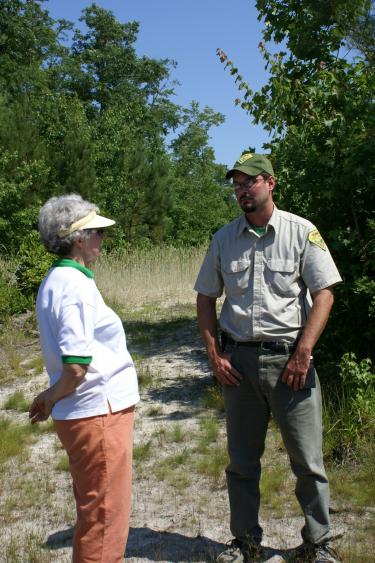Working with a Forester
You've probably noticed that many of the pages in this section encourage you to work with a forester to handle your timber sale. This is because there's a lot at stake when you're harvesting timber and it makes sense to use a professional to ensure that everything is done correctly. Most people wouldn’t sell their property or make a major financial transaction without a professional’s help--and a timber harvest is no different.
Here are some key areas in which a forester's help can make all the difference to your timber harvest:
- A forester can help you determine the right time to harvest your trees. Apart from your own financial situation, many other considerations go into this determination. For example, certain stands may need to be harvested now to improve the health of your woods. Current market conditions and the future value of your timber also matter. For example, a forester might advise you that you will get much more money for your timber if you wait a few years till your timber achieves a certain girth or market conditions improve.
- A forester can help you plan your harvest to meet your goals for your land. He or she will create an inventory of your trees, identify and mark which trees should be cut, appraise their value, suggest appropriate logging techniques, best management practices and access points for your site, and develop a plan for encouraging regeneration and growth in your woods.
- Your forester will know the timber markets and will manage the sale process to protect your interests and maximize your return on harvested timber. He or she will help you advertise your sale, secure and evaluate bids, and prepare a timber sale contract that protects you and your woods.
- Foresters usually know good loggers and reputable buyers in the region. They will supervise the harvest to make sure all guidelines are met and your woods are left in good condition.
- Your forester will be familiar with local and state laws and environmental regulations you may not know about, and will keep your harvest within required guidelines.
As you can see, working with a professional who has experience planning harvests and selling timber can save you a lot of stress and heartache. And it’s better for your bottom line too—studies have shown that landowners who hire consulting foresters to help with their timber sales get up to 58 percent more for their timber.
So how does it work? After choosing the right forester and hiring him or her, you will need to establish a contract and discuss fees for forestry services. A forester may charge by the hour, day, acre or the job. In the case of timber sales, your forester may choose to charge by a percentage of the gross sale income. This fee is often tax-deductible.
The key to working together will be communication. Your forester should listen to and understand your needs, and should in turn provide you with advice and assistance. He or she should be flexible and willing to take charge of as much or as little of the sale process as you wish. Talk to your forester about your priorities and goals for your woods, and allow your forester to help you develop a plan for getting where you want to go.
If you feel at any point in the process that your forester is not serving your best interests, feel free to shop around and find another who will. Don't be shy--remember your forester works for you and you are in charge of the process.
How can I get more tips?
It’s simple! Enter your email below.

